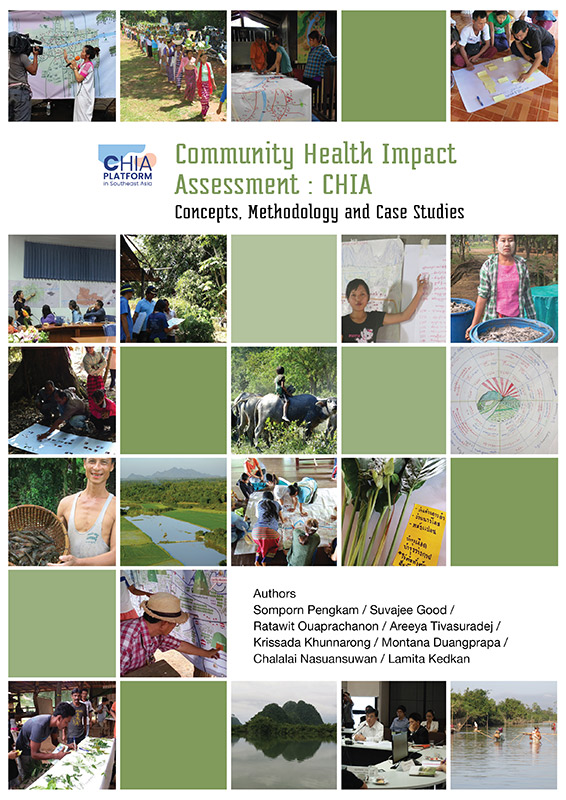Community Health Impact Assessment (CHIA): Concepts, Methodology and Case Studies
Authors: Somporn Pengkam / Suvajee Good / Ratawit Ouaprachanon / Areeya Tivasuradej / Krissada Khunnarong / Montana Duangprapa / Chalalai Nasuansuwan / Lamita Kedkan
Community Health Impact Assessment (CHIA) or Community HIA is a form of HIA approach that accepted by National Health Commission, MOPH Thailand. CHIA developed in Thailand has expands to other ASEAN countries such as Myanmar and potentially in Vietnam. CHIA is also recognized as an important approach/methodology to empower community to take control over their health at regional workshops on health impact assessment conducted by World Health Organization South-East Asia Regional Office (WHO-SEARO) first in Thailand 2015, and again in Bhutan 2016. As a member of WHO-SEARO, Bhutan Government indicated keen interest in learning more about CHIA which likely to be integrated in National Guideline for HIA in the Ministry of Public Health. Honorable Secretary of Health, Ministry of Health, Bhutan is leading delegates from different offices to have study visit to Thailand in September 2016. The study visit is organized by NHCO, MOPH, who also invited the CHIA network in Thailand to prepare briefing for the works that had been achieved in the region.
The authors comprising of numbers of practitioners and experts, who are member of CHIA networks in Thailand and Myanmar, produce this document to synthesize lesson learns from CHIA practices. Concepts, procedures and methodologies in conducting CHIA are demonstrated through eight case studies (five cases from Thailand and two cases from Myanmar). These cases are:
In Thailand:
● Coal-fired power plant project in Kao Hin Son, Phanom Sarakham District, Chachoengsao Province
● Deep-sea port project in Klai, Ta Sa La District, Nakhon Si Thammarat Province
● Illegal disposal of toxic industrial waste at Nong Nae, Phanom Sarakham District, Chachoengsao Province
● Lead contamination recovery project at Klity Lang Village, Kanchanaburi Province
● Stone milling concession and factory in Ban Klang, Ao Luek District, Krabi Province
In Myanmar:
● Cement mining and factory concession at Mayingon Village, Hpa-An, Karen State
● 1,280 MW coal-fired power plant at Andin Village, Pharlain Region, Ye Township, Mon State
This brief describes key concepts, procedures, and methodologies used in CHIA. As a tool, CHIA was used to seek knowledge and information that can be important evidences in ascertaining informed decision in development projects. Cases documented in this document demonstrated how CHIA can enhance assessments that used scientific knowledge and disciplines led by experts. Empirical knowledge that collected by people from accumulative experiences, passing from generation to generations is equally significant to assessments conducted by experts. Voices from local community with years of observations and experiences can be map out and systematically present the situation contextualized with life of the population that affected by the programmes, projects, or policies. The two knowledge systems may be different in terms of approach, methodology, and consideration for validity, yet they are complementary and important to governance system recognizing justice it prevailed.
The authors wish to express our gratitude to Social Research Institute of Chulalongkorn University (CUSRI) and Thai Health Promotion Foundation for supporting this research. We are indebted to involved communities and networks. We also extended our gratitude to WHO South-East Asia Regional Office for providing opportunity to present the cases and technical support to complete this document. The authors wish to see this document facilitates learning process among the CHIA network within the country and international community. We hope that it will create a space for stakeholders to develop similar impact assessment procedures to enforce justice in all dimensions of justice and equity in development; including health equity, social justice and equality, and environment justice where people can have meaningful participation in decision makings, particularly when the decisions would affect their livelihood.
This report is part of a research project on Community Health Impact Assessment and Social Justice.
Under Health and Social Justice Project
Supported by Thai Health Promotion Foundation
Download the full document in this image below.
